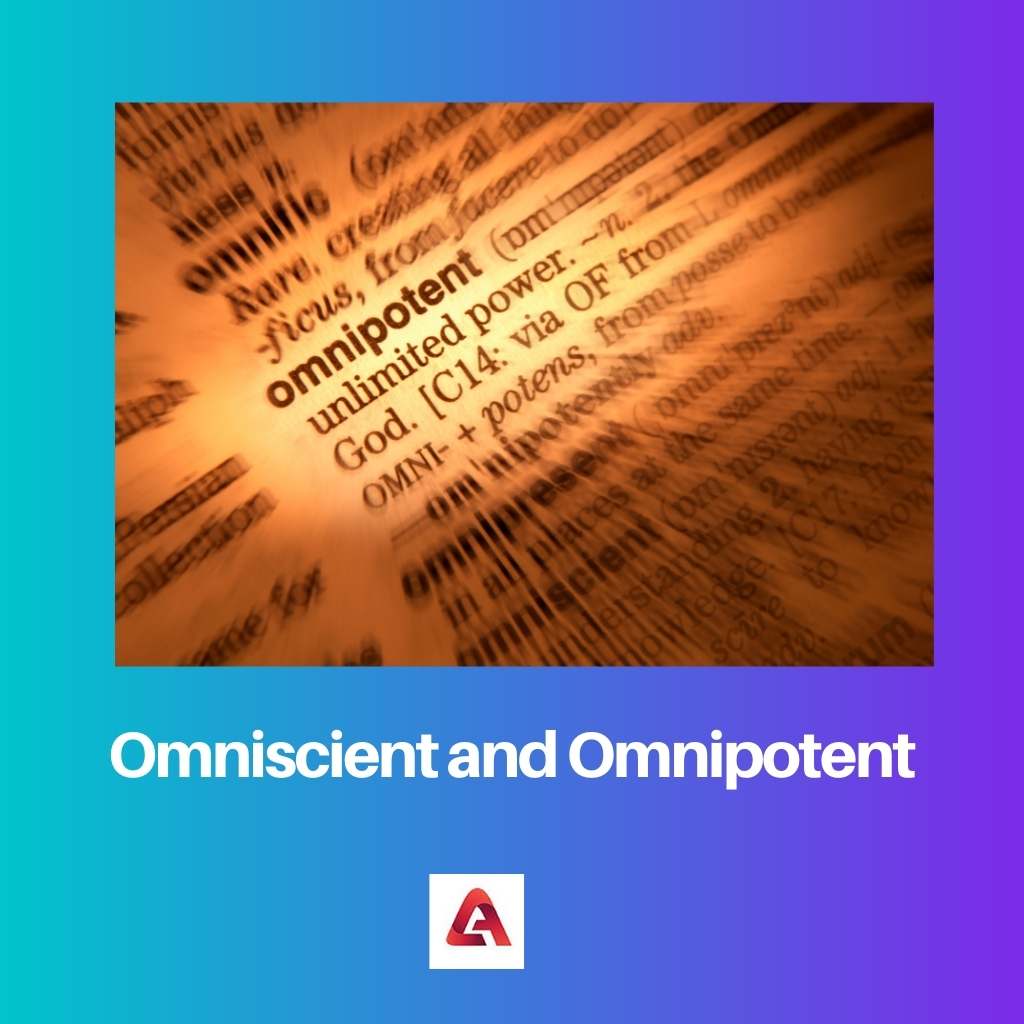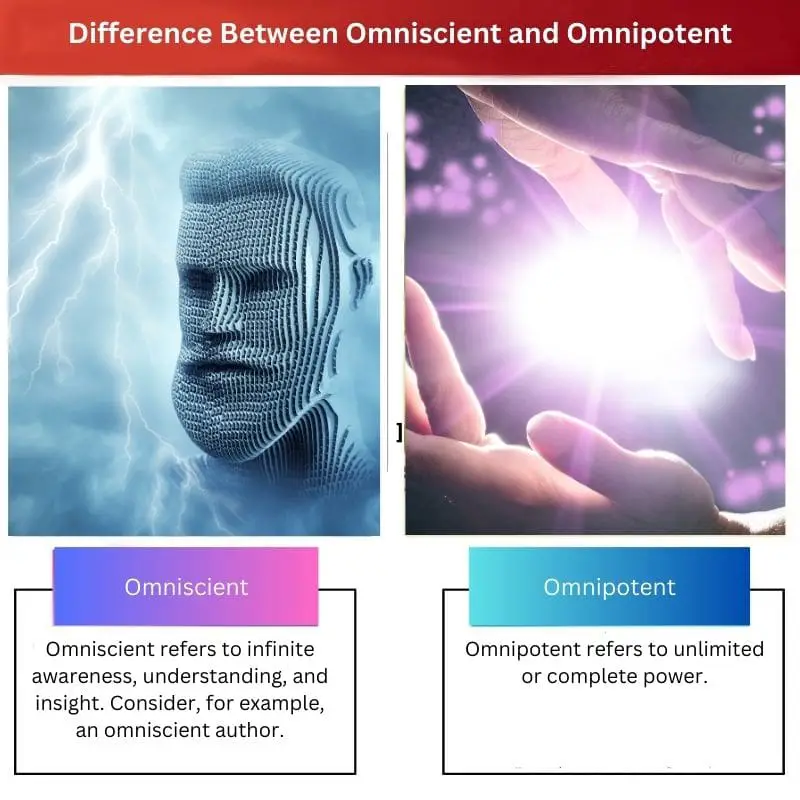Terms and concepts have varying connotations and meanings. As a result, it becomes confusing to differentiate between terminologies.
Omniscient and Omnipotent are two words that have different practical applications. Although the two may seem similar, they have considerable differences.
Key Takeaways
- Omniscience encompasses infinite knowledge, while omnipotence refers to unlimited power.
- An omniscient being knows everything, whereas an omnipotent being can do anything.
- Omniscience relates to intellectual abilities, while omnipotence involves control and influence over all events.
Omniscient and Omnipotent
Omniscient refers to having complete or unlimited knowledge and awareness of all things, including the past, present, and future. Omnipotent refers to unlimited power or authority attributed to a divine or supernatural entity and is believed to be able to do anything.

Omniscient refers to infinite awareness, understanding, and insight. Omniscient can have a practical application both as a noun and an adjective. In addition, it may have a use to address the characteristics of a creator or a supreme being.
To conclude, omniscient refers to the multitude of knowledge that knows no bounds.
Omnipotent refers to unlimited or complete power. Omnipotent has been used in association with God with unlimited powers. The word omnipotent came from the Anglo-French to English.
The Supreme faith of all religions is omnipotent. In addition, synonyms of omnipotent are almighty or all-powerful. An omnipotent individual has control of all situations and circumstances.
Comparison Table
| Parameters of Comparison | Omniscient | Omnipotent |
|---|---|---|
| Definition | Omniscient refers to infinite awareness, understanding, and insight. Consider, for example, an omniscient author. | Omnipotent refers to unlimited or complete power. |
| Another Meaning | Another meaning of omniscient is the possession of complete knowledge or awareness. | Another definition of omnipotent is unlimited authority or power of an individual. |
| Origin | Omniscient originates from two Latin words omni and scire which mean all and to know respectively. | The word omnipotent originates from the Latin words omni and potens which means all and potent respectively. |
| Year of Use | The word omniscient was first used in 1598 to indicate infinite knowledge and awareness. | Omnipotent has had a practical application as an English adjective from the beginning of the 14th century. |
| Example | An omniscient author | An omnipotent ruler |
What is Omniscient?
By definition, omniscient refers to infinite awareness, understanding, and insight. Consider, for example, an omniscient author. Here, omniscient implies the vast knowledge of the author.
Another meaning of omniscient is the possession of complete knowledge or awareness. For example, omniscient God refers to the limitless awareness of God.
An omniscient person knows all. The word omniscient has been in use since the start of the 17th century. It originates from two Latin words Omni and scire connotating all and to know.
An adverb from omniscient is omniscient. The word omniscient was first used in 1598 to indicate infinite knowledge and awareness.
Omniscient can have a practical application both as a noun and an adjective. In addition, it may have a use to address the characteristics of a creator or a supreme being.
Omniscient also refers to the totality of an individual’s character traits. God has a definition of an omniscient and omnipotent being in Christian mythology.
Omniscient has two categories: inherent and total. Inherent refers to the knowledge of what should be known and what can be known.
Total, on the other hand, refers to the universality of knowledge despite any inclination or desire. To conclude, omniscient refers to the multitude of knowledge that knows no bounds.
What is Omnipotent?
By definition, omnipotent refers to unlimited or complete power. Omnipotent has used in association with God. Another definition of omnipotent is the unlimited authority or power of an individual.
Consider, for instance, an omnipotent ruler. Here, omnipotent refers to the limitless power of the ruler.
Adjective forms of omnipotent are omnipotent and non-omnipotently. In addition, synonyms of omnipotent are almighty or all-powerful.
An omnipotent individual has total control of all situations and circumstances. Heads of state or powerful monarchs are defined as powerful or omnipotent in their rules and jurisdiction.
The word omnipotent originates from the Latin words Omni and potent meaning all and potent. Omnipotent has had a practical application as an English adjective since the beginning of the 14th century.
From the beginning of the 17th century, omnipotent also has a use as a noun. The word omnipotent came from the Anglo-French to English.
The Supreme faith of all religions is classified as omnipotent. Believers of different religions attribute ultimate power to their respective Gods.
In addition, the omnipotence of the Supreme faith indicates their ability to exercise their limitless authority. To conclude, Omnipotents possess indefinite power and authority.

Main Differences Between Omniscient and Omnipotent
- Omniscient refers to infinite awareness, understanding, and insight. Consider, for example, an omniscient author. In contrast, omnipotent refers to unlimited or complete power.
- Omniscient originates from two Latin words, Omni and scire which mean all and to know. On the other hand, the word omnipotent originates from the Latin words Omni and potent, which means all and potent.
- Another meaning of omniscient is the possession of complete knowledge or awareness. On the other hand, another definition of omnipotent is an individual’s unlimited authority or power.
- The word omniscient was first used in 1598 to indicate infinite knowledge and awareness. In contrast, omnipotent has had a practical application as an English adjective from the beginning of the 14th century.
- An example of an omniscient is an omniscient author. On the other hand, an omnipotent is an omnipotent ruler.


The distinction between inherent and total omniscience was particularly fascinating. I hadn’t thought of it that way before.
The use of historical references and examples added depth to the explanation.
I agree, the historical context was a nice touch.
Absolutely, it made the content more engaging and easier to relate to.
An impeccably articulated and comprehensive explanation of these terms!
This article was really interesting and informative. I particularly liked the explanation of the practical applications of the terms.
I agree, I found it very insightful too, the comparison table was very helpful.
I didn’t fully agree with the conclusion about omnipotent being an individual’s unlimited authority or power, but overall it was a well-written article.
I think the author’s intention was to emphasize omnipotent in the context of religious figures, not necessarily for individuals. But I see your point.
I found the breakdown of the terms’ etymology and meanings very enlightening. It provided a clear understanding of both terms.